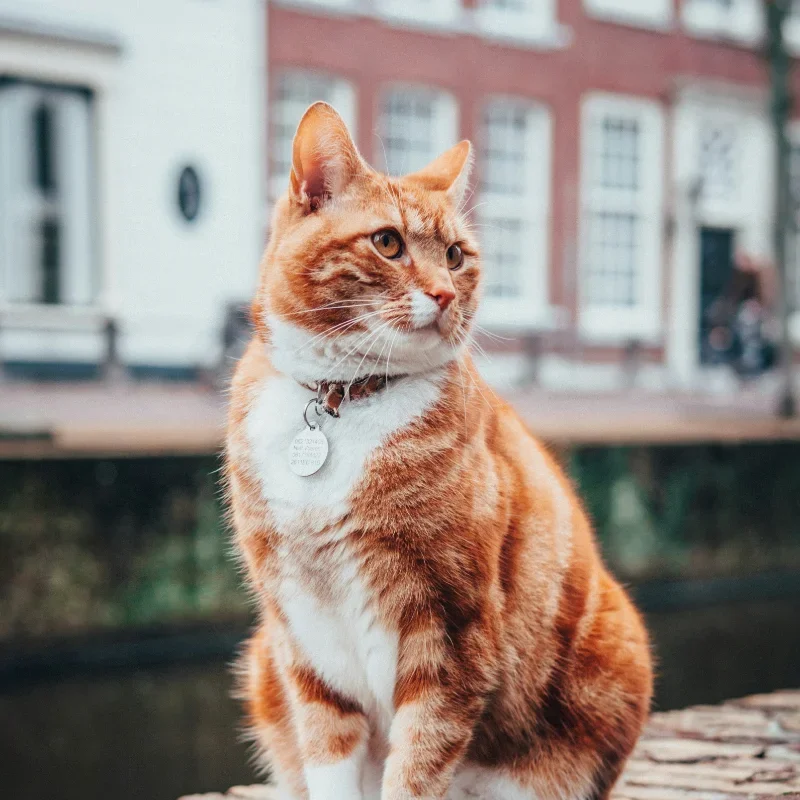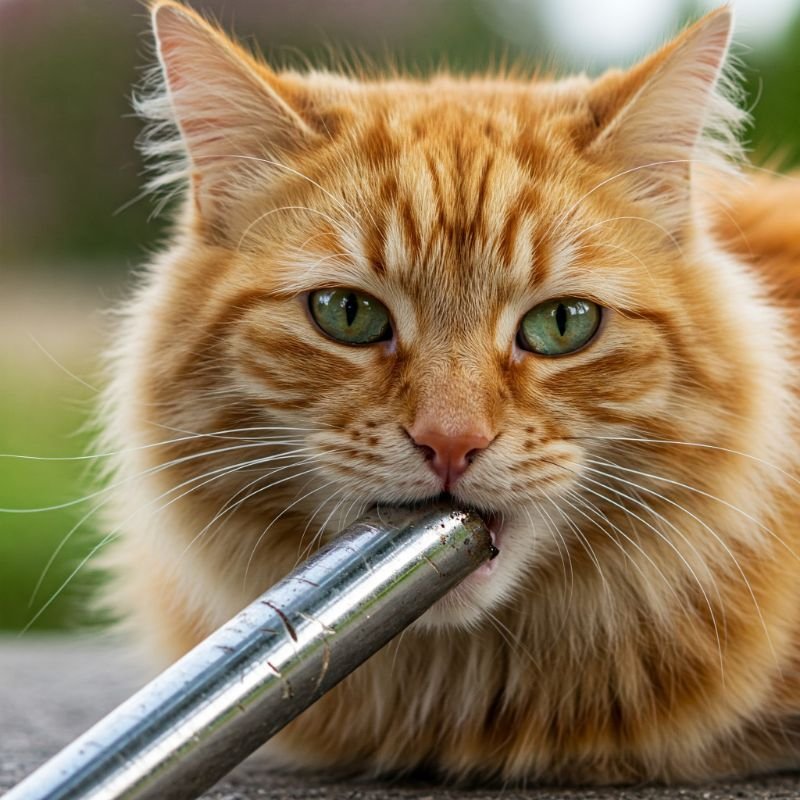Why Is My Cat Drooling? Common Causes and Solutions
Discover why your cat's drooling, from happy purrs to health concerns. Learn when it's normal and when to call the vet immediately.
Well, there you were, enjoying a perfectly peaceful cuddle session with your feline friend, when suddenly you notice something wet on your shirt. Yep, your cat's been drooling all over you like a Saint Bernard at a barbecue! If you're frantically googling "why is my cat drooling?" you've definitely come to the right place. Now, before you start panicking and rushing off to the emergency vet, take a deep breath. Understanding why is my cat drooling? Common causes and solutions can help you figure out whether you're dealing with a happy kitty or something that needs attention. Unlike dogs, who seem to have made drooling their signature move, cats typically keep their saliva situation under control. So when Mr. Whiskers starts leaving little puddles everywhere, it's natural to wonder what's going on. The truth is, cat drooling can range from "aww, that's actually kinda cute" to "okay, we need to see the vet right now." Learning to tell the difference between these scenarios isn't just helpful; it could literally save your cat's life. Whether your kitty's turned into a drool machine overnight or you've noticed a gradual increase in the slobber department, we're about to uncover everything you need to know about this wet and wild phenomenon!
The Basics: Understanding Normal vs. Abnormal Drooling
Before we dive into the nitty-gritty, let's establish what's normal in the feline drool department and what should have you speed-dialing your vet.
When Drooling Is Actually Pretty Normal
Believe it or not, some drooling situations are totally fine! Here's when you can probably relax:
The Love Drool Some cats literally drool with happiness. When they're purring up a storm, kneading your lap, and looking at you with those slow-blink "I love you" eyes, a little drool might escape. It's basically their way of saying you're doing everything right!
The Catnip Crazies Holy moly, give some cats a hit of that green stuff, and they turn into drooling, rolling, ridiculous furballs. If your cat becomes a slobber monster after their catnip fix, that's pretty standard stuff.
The Stress Response Ironically, both extreme relaxation and stress can cause drooling. That car ride to the vet? Yeah, that might trigger some nervous drooling. Not fun, but not necessarily dangerous either.
Red Flag Drooling Situations
Now, here's when things get serious:
Sudden onset of heavy drooling
Drooling accompanied by bad breath
Difficulty eating or dropping food
Pawing at the mouth
Visible swelling or bleeding
Lethargy or behavior changes
Why Is My Cat Drooling? Common Causes and Solutions Revealed
Let's break down the various reasons your cat might be channeling their inner waterfall, starting with the less serious stuff and working our way up to the "call the vet NOW" scenarios.
Dental and Oral Health Issues
This is biggie number one, folks! Dental problems are the leading cause of unexpected cat drooling, and boy, can they be sneaky.
Gingivitis and Periodontal Disease Just like humans, cats can develop gum disease. Those bacteria throwing a party in your cat's mouth can cause inflammation, pain, and yes, excessive drooling. Signs to watch for:
Red, swollen gums
Yellow or brown teeth buildup
Reluctance to eat hard food
Dropping food while eating
Face rubbing or pawing
Tooth Resorption This painful condition, where the tooth basically dissolves from the inside out, affects tons of cats. It's like having a constant toothache, and drooling's their way of saying "this hurts!"
Oral Tumors Nobody wants to think about the C-word, but oral tumors can cause drooling, especially in older cats. If you notice any lumps, bumps, or weird growths in your cat's mouth, don't wait around hoping they'll disappear.
Foreign Objects and Injuries
Cats explore the world with their mouths, and sometimes that backfires spectacularly.
Stuck Objects From string to grass blades to tiny toy parts, stuff can get lodged in the most inconvenient places:
Between teeth
Under the tongue
In the roof of the mouth
Wrapped around teeth or tongue
Trauma and Injuries Maybe Fluffy had a run-in with another cat, took a tumble, or bit down on something sharp. Mouth injuries can cause immediate and profuse drooling. Check for:
Visible cuts or wounds
Swelling
Bleeding
Broken or loose teeth
Toxic Substances and Poisoning
This is where things get scary real fast. Cats are curious creatures, and their definition of "edible" sometimes differs wildly from reality.
Common Household Toxins That Cause Drooling:
Cleaning products (even residue on surfaces)
Certain plants (lilies are deadly!)
Human medications
Antifreeze (sweet taste, deadly consequences)
Essential oils
Insecticides and rodenticides
If you suspect poisoning, don't wait for other symptoms. Time is literally of the essence here!
Plant Poisoning Particulars Speaking of plants, here's a PSA: lots of common houseplants are toxic to cats. Even nibbling can cause drooling, vomiting, and worse:
Lilies (all parts, even pollen)
Azaleas
Tulips
Sago palms
Philodendrons
Nausea and Digestive Issues
Sometimes the drooling starts from the other end of the digestive tract, so to speak.
Motion Sickness That car ride might be making your cat queasy. Signs include:
Excessive drooling
Meowing or crying
Lethargy
Vomiting (obviously)
Gastrointestinal Problems From hairballs to inflammatory bowel disease, tummy troubles can trigger drooling. If your cat's also showing these symptoms, something's up:
Decreased appetite
Weight loss
Diarrhea or constipation
Vomiting
Hiding behavior
Neurological Causes
When the nervous system goes haywire, drooling might be just one piece of a bigger puzzle.
Seizures Drooling during or after a seizure is common. Other signs include:
Loss of consciousness
Involuntary movements
Confusion afterward
Temporary blindness
Facial Nerve Paralysis If the nerves controlling facial muscles aren't working properly, your cat might not be able to keep saliva in their mouth. This could result from injury, infection, or other neurological conditions.
Why Is My Cat Drooling? Common Causes and Solutions for Different Age Groups
Age plays a huge role in determining what might be causing your cat's drooling episodes.
Kitten Concerns
Those tiny furballs have their own unique drooling triggers:
Teething Troubles Between 3-6 months, kittens lose their baby teeth and grow adult ones. This process can cause:
Mild drooling
Chewing everything in sight
Slightly swollen gums
Occasional bleeding
Exploring Gone Wrong Kittens are basically furry toddlers, putting everything in their mouths. They're more likely to:
Chew on toxic plants
Swallow foreign objects
Get into cleaning supplies
Adult Cat Considerations
Prime-of-life cats (1-10 years) often drool due to:
Dental disease (starts showing up around age 3)
Stress or anxiety
Upper respiratory infections
Accidental poisoning
Senior Cat Situations
Our golden oldies (10+ years) face additional challenges:
Higher risk of oral tumors
Kidney disease (causes oral ulcers)
Cognitive dysfunction
Medication side effects
Chronic dental disease
Behavioral and Emotional Triggers
Sometimes drooling isn't about physical health at all, but what's going on in that mysterious feline brain.
The Happy Drooler Phenomenon
Some cats are just happy droolers, and there's nothing wrong with that! They might drool when:
Getting chin scratches
Purring intensely
Kneading on soft blankets
Hearing the treat bag crinkle
Stress and Anxiety Drooling
On the flip side, stressed cats might drool due to:
Vet visits (the classic)
Moving homes
New pets or people
Loud noises (fireworks, construction)
Changes in routine
The Medication Factor
Certain medications can cause drooling as a side effect:
Some antibiotics
Pain medications
Anti-anxiety drugs
Flea and tick treatments (especially if licked)
Diagnostic Steps: What Your Vet Will Do
When you bring your drooling cat to the vet, here's what to expect during the investigation.
The Initial Examination
Your vet will start with:
Complete oral examination (might need sedation)
Temperature check
Heart and lung assessment
Lymph node palpation
Abdominal palpation
Diagnostic Tests They Might Recommend
Depending on findings:
Blood work (CBC, chemistry panel)
Urinalysis
Dental X-rays
FeLV/FIV testing
Ultrasound or regular X-rays
Biopsy (if masses found)
Home Care and First Aid
While some situations require immediate veterinary attention, there are things you can do at home to help your drooling kitty.
Immediate Actions
For Suspected Foreign Object:
Gently open your cat's mouth (good luck!)
Look for visible objects
DON'T try to remove anything yourself unless it's easily grabbable
Head to the vet if you see something stuck
For Suspected Poisoning:
Remove cat from the source immediately
Call pet poison helpline
Don't induce vomiting unless instructed
Bring the substance/plant to the vet
Comfort Measures
While waiting for your vet appointment:
Keep your cat calm and comfortable
Offer water frequently
Wipe away drool gently with soft cloth
Monitor for worsening symptoms
Keep other pets away (reduce stress)
Prevention Strategies: Keeping the Drool at Bay
An ounce of prevention is worth a pound of cure, especially when it comes to cat drool!
Dental Health Maintenance
Daily Dental Care:
Brush teeth (yes, really!)
Dental treats and chews
Water additives for dental health
Regular professional cleanings
Cat-Proofing Your Home
Make your space safer:
Research all plants before bringing them home
Secure cleaning supplies in locked cabinets
Keep medications out of reach
Check for small objects that could be swallowed
Inspect toys regularly for damage
Regular Vet Checkups
Don't skip those annual (or bi-annual for seniors) checkups! Your vet can catch problems before they become drool-worthy disasters.
When to Panic (And When Not To)
Let's get real about when you need to drop everything and rush to the emergency vet.
Emergency Situations Requiring Immediate Care:
Suspected poisoning
Difficulty breathing
Seizures
Severe facial swelling
Inability to close mouth
Profuse bleeding from mouth
Signs of extreme pain
Wait-and-See Scenarios:
Happy drooling during petting
Mild drooling after catnip
Temporary drooling during car rides
Slight drooling while sleeping
The Gray Areas
Some situations fall in between:
Persistent drooling for more than a day
Drooling with decreased appetite
Bad breath accompanying drool
Behavior changes with drooling
When in doubt, call your vet's office. They'd rather answer a "silly" question than have you wait too long!
Living with a Drooling Cat
If your cat's a chronic drooler due to a manageable condition, here's how to cope:
Practical Management Tips
Use waterproof blankets on favorite spots
Keep soft cloths handy for wiping
Protect furniture with washable covers
Consider a bib (yes, they make them for cats!)
Regular grooming to prevent matted fur
Monitoring for Changes
Keep a drool diary noting:
Frequency and amount
Triggers (if any)
Associated behaviors
Any other symptoms
This information is gold for your vet!
Conclusion
So there you have it, fellow cat parents! Understanding why is my cat drooling? Common causes and solutions helps you determine whether you're dealing with a love-drunk kitty or a genuine medical concern. From dental disease to toxic plants to plain old happiness, drooling can stem from numerous sources. The key is knowing your cat's normal behavior and acting quickly when something seems off. Remember, you know your furball best, so trust your instincts. When in doubt, that vet visit's always worth the peace of mind. Keep those pearly whites clean, cat-proof your home, and here's to many more drool-free snuggle sessions!
Read next: 15 Cat Room Ideas for a Cozy, Stylish Pet Space
Frequently Asked Questions
Q1: Is it normal for cats to drool while purring?
A: Yes, some cats drool when extremely happy and relaxed while purring intensively.
Q2: Can stress cause sudden drooling in cats?
A: Absolutely! Vet visits, car rides, and changes often trigger stress-related drooling episodes.
Q3: Should I brush my cat's teeth to prevent drooling?
A: Yes, regular dental care helps prevent dental disease, a major cause of drooling.
Q4: How quickly should I act if my cat suddenly starts drooling?
A: If heavy or accompanied by other symptoms, seek veterinary care immediately, don't wait.
Q5: Can indoor cats get poisoned and drool?
A: Yes, many household items like plants and cleaners are toxic to curious cats.


















